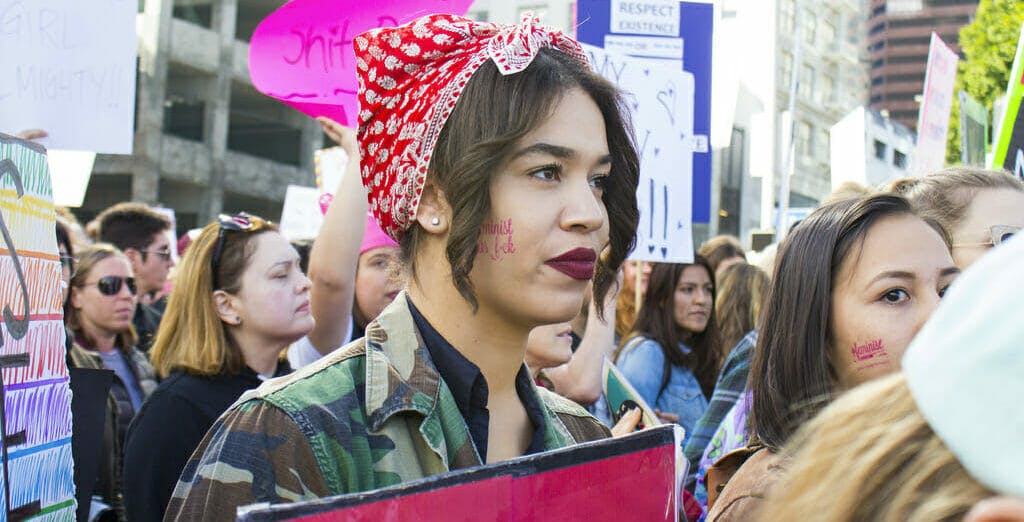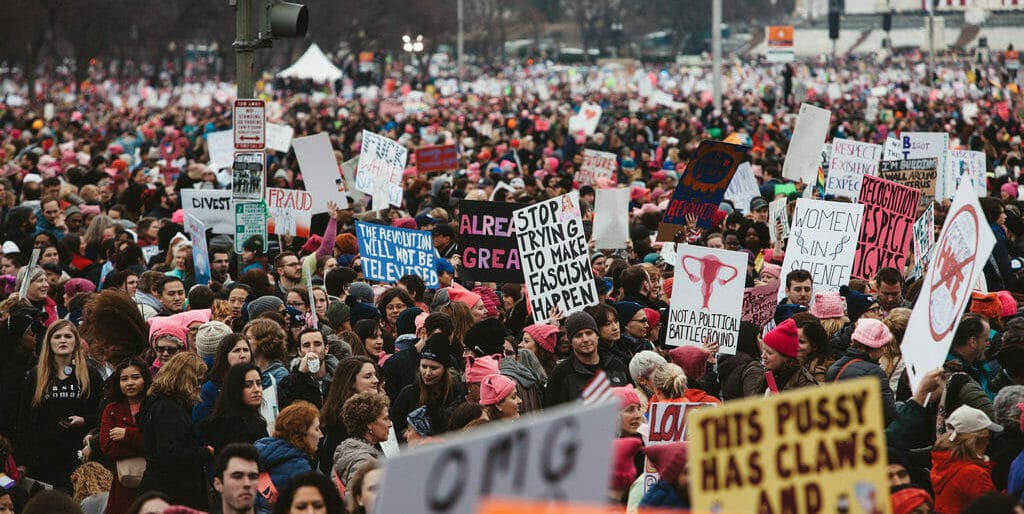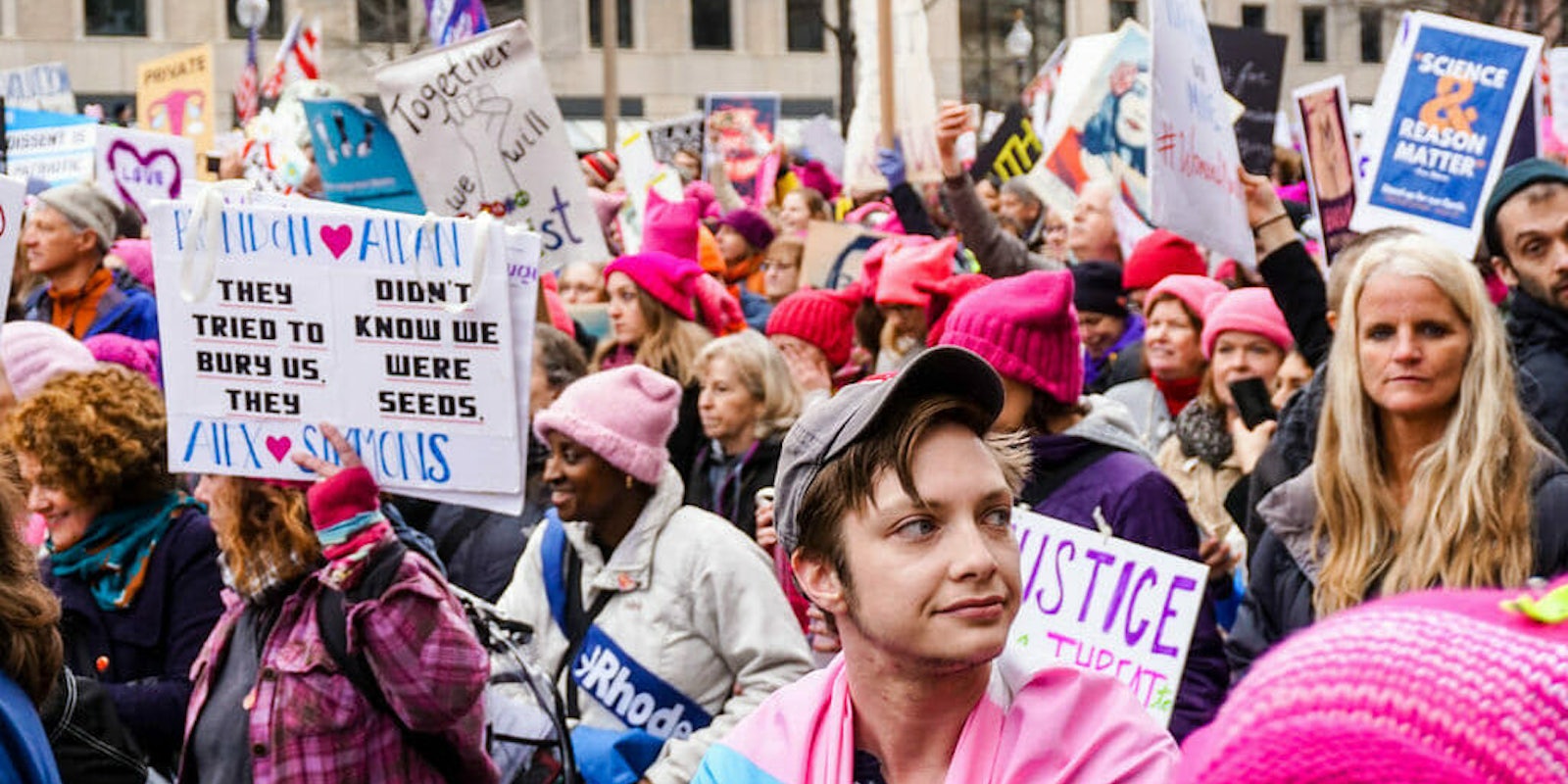Grab your poster board and feminist-branded hat: On Jan. 19, the 2019 Women’s March is set to kick off on the National Mall in Washington, D.C. This marks the third annual Women’s March since January 2017, just after Trump took office.
As in past years, the large-scale protest will be accompanied by dozens of sister marches across the United States and in major cities on six continents. It will also aim to “harness the political power of diverse women and their communities to create transformative social change.”
Women’s March 2019: What you need to know
“The 2019 Women’s March marks two years of resistance to the Trump presidency, two years of training new activists, and two years of building power,” the event’s official website reads. “And this time, we’re coming back with an agenda.”
That “agenda” is made manifest in the form of a policy platform the group unveiled in December, literally dubbed “the Women’s Agenda,” which lays out a set of 10 lofty federal policy guidelines including “ending state violence” and achieving “reproductive rights and justice.”
But the group’s organizers, and their high-minded objectives, have become the subject of a series of controversies in the past year and a half. As a result, progressive groups like the Democratic National Committee, Southern Poverty Law Center, Human Rights Campaign, and Emily’s List have yanked their names from the march’s long list of sponsors and threatened to destabilize the entire operation.
In order to understand that tangled web of accusations—with allegations of failure to reject anti-Semitism chief among them—we need to talk about how the group came to exist in its current form in the first place, and where exactly things went south.
Women’s March history

The Women’s March was initially conceived of as counter-programming to President Donald Trump’s presidency, with the inaugural march in 2017 scheduled to take place the day after his swearing-in ceremony. If you’ll recall, women were particularly fired up at the time, thanks in no small part to a certain “grab them by the pussy” Access Hollywood tape that had leaked in the days leading up to the 2016 presidential election—not to mention, the general aura of misogyny that had oozed out of his campaign.
When Trump eventually won the presidency—defeating Hillary Clinton, the first woman presidential candidate put forth by either the Republican or Democratic parties, in the process—there was suddenly a significant and specific market for female outrage in America.
READ MORE:
- Here’s why sex work is legitimate work
- SWERFS: Sex worker-exclusionary radical feminists, explained
- What exactly is intersectionality? A complete history of the term
- What is social justice? The rise of the social justice warrior
Amid that fervor in November 2016, women across the country began to organize. In the beginning, they took to Facebook groups like Pantsuit Nation to vent, commiserate, and take action. After at least four women realized that they had created separate events, all in the name of marching to protest the incoming administration, they teamed up to fuse their purposes under one banner: the Women’s March on Washington, which quickly enlisted thousands of women who were ready to protest Trump and his policies.
As Inauguration Day approached and the planning got underway, the group appointed Tamika Mallory, Carmen Perez, and Linda Sarsour (along with Bob Bland, who had formed one of the early Facebook groups that had inspired the idea for the march) as national co-chairs in order to ensure that the event would continue to champion the principles of diversity and inclusion that it had been founded upon.
The eventual march would go on to boast an estimated 500,000 attendees—a number that blew earlier estimates out of the water.
Women’s March controversy

But amid all the successes the Women’s March had enjoyed in 2017, controversy was brewing. Critics of the group’s politics were quick to point out that two of its co-founders—Mallory and Perez—had close ties to controversial Nation of Islam leader Louis Farrakhan, who has a documented history of making anti-gay and anti-Semitic comments.
The group’s leadership continued to ardently deny that anything was afoul with its politics, though. When New York Times columnist Bari Weiss pointed out the Farrakhan connection, Bland fired back in an op-ed of her own, calling Weiss and other would-be critics “apologists for the status quo, racist ideology, and the white nationalist patriarchy.”
Complicating the growing controversy surrounding the Women’s March was the fact that the group’s professed politics skewed radical at times, including its embrace of former member of the Black Liberation Army and convicted murderer Assata Shakur, and the fact that Sarsour—a Palestinian activist—had previously said on Twitter that there is “nothing is creepier than Zionism.”
READ MORE:
- Breaking down the difference between gender identity and sex
- 11 important things you didn’t know about Planned Parenthood
- The reason why IUDs are so popular right now
- Twitter is thoroughly unsurprised that hate crimes rose for a third year in a row
But in December of 2018, just weeks shy of the third march, Tablet magazine ignited a firestorm by publishing a damning report on one of the earliest meetings between the newly established leadership team, during which Mallory and Perez had reportedly made comments suggesting that Jews were among the primary exploiters of Black Americans and shared culpability for the American slave trade—mistruths perpetuated by The Secret Relationship Between Blacks and Jews, a book published by Farrakhan’s Nation of Islam.
On Monday, Bland and Mallory sat for an interview with ladies of The View to address past controversies—including an Instagram photo posted by Mallory that shows her with her arm around Farrakhan, the caption of which refers to him as the “GOAT” or “Greatest Of All Time.”
Despite being repeatedly pressed by co-host Meghan McCain on whether or not she would condemn Farrakhan’s past anti-Semitic comments, Mallory refused, sparking a new wave of controversy for the already embattled group and resulting in notable voices of the movement—including some of the March’s original co-founders—calling for the leadership team to step down once and for all.
In response to all the controversy, around half of the sponsors listed for the 2018 march will not be participating in this year’s event, according to the Daily Beast. Planned Parenthood, one of the most prominent supporters of the march since its inception, will still take part.
Women’s March 2019: Where and when
Across the U.S. last year, the Women’s Marches pulled in about half the numbers (1.6.-2.5 million) than that of the inaugural marches (4 million). It is expected, especially in light of all the controversies, that this year’s numbers will also be on the decline.
Those interested in the D.C. march should meet at the National Mall at 10am on Saturday, Jan. 19, 2019. The march will proceed from there to the steps of the Lincoln Memorial, where a rally will be held from 1:30pm to 4pm.
For more information about sister rallies in your area, go to the official Women’s March site.


